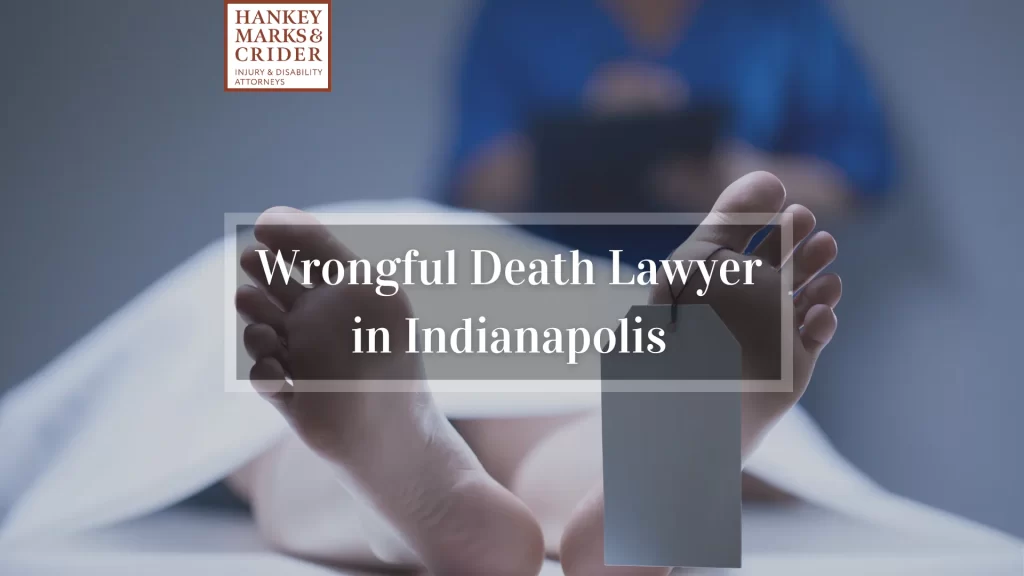
Losing a loved one is among the hardest experiences most people deal with over the course of a lifetime. Many of the most common causes of death, including cardiovascular disease, cancer, and plain old age have a reasonable explanation. Family members know, in these cases, that the death of their relative was not the fault of any specific person or entity but the result of disease or a life well-lived. Unfortunately, this is not always the case. Millions of Americans each year must live with the knowledge that their loved one died because of someone else’s negligence. A negligent party or entity could have prevented the death. This is why you need to hire an Indianapolis wrongful death lawyer from Hankey Marks & Crider.
These types of deaths are unfortunately common and can result from the negligent behavior of any person or entity, from a car dealership that sold a defective vehicle to a hospital charged with medical malpractice. Consulting with experienced wrongful death lawyers in Indianapolis is integral in handling the complexities of such cases. Read on to learn who can sue in a wrongful death suit, examples of wrongful death cases, and how a personal injury attorney can help you.
Wrongful Death vs. Negligence
The essential elements of a wrongful death suit are that one person died and the negligent actions of another person or party caused the death. In legal terms, negligence means that the responsible party failed to act in a way that a reasonable person would have. The difference between wrongful death and a typical negligence case is who brings the lawsuit to court. In wrongful death suits, the person or people are suing the negligent party on behalf of their deceased loved one, whereas the victim of negligence is usually the plaintiff in a negligence suit.
Cases We Handle
Wrongful death cases cover a wide range of negligent behaviors. At Hankey Marks & Crider, we handle cases in which the defendant acted negligently, their negligence caused a death, and the family of the victim is suffering financially as a result of the incident. We can fight for compensation if your loved one died as the result of one of the following:
- Pharmaceutical error
- Reckless or aggressive driving
- Anesthesiology mistake
- Drunk driving accident
- Surgical error
- Bicycle accident
- Nursing home abuse or neglect
- Pedestrian accident
- Chiropractor negligence
- Missed, wrong or improper diagnosis
- Employer safety negligence
- Truck accident
- Construction accident
- Work injuries
Filing a wrongful death claim is crucial for the surviving family members to seek compensation and handle the legal processes involved in a wrongful death action. It is important to keep in mind that wrongful death is a civil, rather than criminal, charge. Civil cases imply that the victim is looking for financial compensation or emotional closure rather than a punishment for the defendant. Although many plaintiffs choose to bring criminal charges for the same events that caused a civil wrongful death charge, it is not required and the two cases will be tried separately.
Statute of Limitations
In addition, you must consider the statute of limitations at work in your case. The statute of limitations is the amount of time following an accident that one has to file a lawsuit regarding that accident. This time period varies by state and the type of case you wish to file. Under Indiana state law, the personal representative of the deceased person’s estate has two years from the date of death to file a lawsuit. If the personal representative waits any longer than two years, their case will no longer be valid.
Indiana Accident Statistics
Indiana law defines wrongful death claims as those arising from the death of a person caused by the wrongful act or omission of another, and understanding these legal criteria is integral for pursuing a claim. To understand the bigger picture surrounding wrongful death lawsuits, it is useful to know the most relevant information about the cases. Two of the most common types of wrongful death lawsuits concern car accidents and medical malpractice. Below are some statistics to help you gauge how serious these issues are in Indiana.
Car Accidents
Car, truck, and bike accidents account for a large percentage of wrongful death cases. These accidents are unexpected and can be extremely traumatic for the family members who lose their loved ones to them. Whether the driver was speeding, driving under the influence, or ignoring red lights and stop signs, they altered the course of another person’s life and should be held accountable for their actions. Here are some of the statistics related to car accidents, according to the Insurance Institute for Highway Safety (IIHS):
- Total number of fatal crashes in the U.S. in 2022: 42,514
- Fatality rate in the U.S. in 2022: 12.8 deaths per 100,000 people
- Total number of fatal crashes in Indiana in 2022: 949
- Fatality rate in Indiana in 2022: 13.9 deaths per 100,000 people
These statistics indicate that 0.99 deaths occurred per 100 million miles travelled in Indiana in 2022. This proportion is slightly higher than the national average.
Medical Malpractice
Instances of medical malpractice can range from delayed treatment time to operating at the wrong surgical site, and doctors, nurses, hospitals, anesthesiologists, and other health care entities can all be charged with wrongful acts leading to medical malpractice. Losing a loved one to medical malpractice is especially devastating because we put so much faith in our medical providers. These 2024 statistics come from the Department of Health & Human Services National Practitioner Data Bank (NPDB):
- Total medical malpractice payments reports in the U.S.: 517,502
- Total adverse action reports in the U.S.: 1,125,249
- Total medical malpractice payments reports in Indiana: 10,059
- Total adverse action reports in Indiana: 20,584
These numbers encompass 1990 to 2024 and account for all NPDB practitioners. Medical malpractice payment reports are settlements paid out to benefit a medical professional, meaning a victim received compensation for the claim. Adverse action reports are similar, but they cover adverse actions, which is a lesser offense than medical malpractice.
Examples of Wrongful Death Cases
Wrongful death cases cover a diverse range of issues. One thing they all have in common is that a person or entity acted negligently and caused the death of an individual. Below are just a few possible wrongful death scenarios.
Understanding the legal context of Indiana wrongful death cases is crucial, as state-specific regulations can significantly impact the outcome of a case.
Drunk Driving
Your loved one was leaving a restaurant late one evening just as a local bar was closing. They safely made it to the highway, but your loved one’s death occurred when they were struck and killed by a drunk driver headed the wrong direction on the interstate. The drunk driver could owe you thousands of dollars in compensation for funeral expenses and all expenses related to handling the vehicle, such as towing, repairs, or buying a new vehicle.
Medical Malpractice
Your loved one goes in for treatment at the nearest hospital. They undergo a simple knee surgery they had planned for weeks. A negligent anesthesiologist gives the patient twice as much anesthesia as they need and the patient passes away. You are likely entitled to compensation for their outstanding medical and insurance bills.
It is integral to consult an attorney for an Indiana wrongful death claim in medical malpractice cases to handle the legal process and ensure you receive the compensation you deserve.
Nursing Home Neglect
You put your loved one in a nursing home with good reviews because you assume they will receive proper care there. Instead, a nurse fails to check on your loved one for too long, and they develop serious bed sores. By the time they receive treatment, the sores have become infected, and your loved one dies because of the infection. Their family is entitled to nursing home costs, medical expenses, and burial costs through a wrongful death lawsuit.
Frequently Asked Questions
We strongly encourage you to contact an attorney if you’re dealing with the unexpected death of a loved one, but we also understand that you may have a lot on your plate following an event like this. For your convenience, we have compiled some of the questions we have to answer most frequently:
What is the role of a wrongful death attorney?
A Indianapolis wrongful death attorney plays a critical role in handling the complexities of wrongful death claims. They have the expertise to secure compensation for grieving families affected by the negligent or wrongful actions of others. Hiring a wrongful death attorney can help avoid pitfalls, ensure timely and accurate filings, and provide the necessary legal support throughout the process.
How much is my case worth?
It is impossible to answer this question precisely without knowing the details of your case. However, Indiana caps the amount of damages a family or individual can receive at $30,000 in all wrongful death cases. Some expenses that the reward for a wrongful death case can cover include medical bills, funeral expenses, and the amount of money lost by losing the typical income of the deceased person. In addition, a wrongful death suit cannot compensate you for grief in Indiana. However, you could receive compensation for the loss of companionship if a parent or parents file on behalf of a child.
Why should I seek compensation?
Although you cannot receive financial compensation for grief in our state, a wrongful death suit can hold a negligent party accountable when they deserve it. Emotional pain is not something to be taken lightly, and families that are mourning the loss of the loved one know this all too well. If you depended on the income of your deceased relative or are having trouble paying their outstanding bills, any amount of compensation can help.
Consequently, hiring an Indianapolis wrongful death attorney is import to handling the legal process effectively.
Why should I choose Hankey Marks & Crider?
Our wrongful death attorneys in Indianapolis have years of experience fighting wrongful death cases in Indiana. We understand how hard it is to lose someone you love, especially if you depended on them for financial and emotional support. If you choose to let us handle your case, we will treat you with the utmost respect and compassion while fighting tooth and nail to win every cent possible from the defendant. Our firm’s goal is to take the weight off your shoulders so you can focus on moving forward without stress, guilt, or unnecessary struggle.
Contact Us
The attorneys at Hankey Marks & Crider are here to bring justice to people who need it most. If you are struggling with the death of a loved one whose life was taken by an act of negligence, let us help you. To discuss the details of your case, contact an Indianapolis wrongful death attorneys at (317) 634-8565. It is important to contact a wrongful death attorney to handle your claim and ensure timely and accurate filings.


